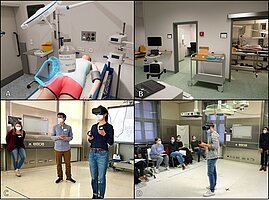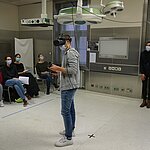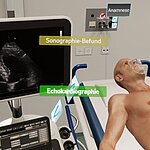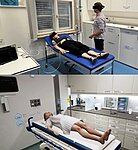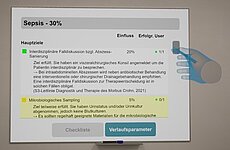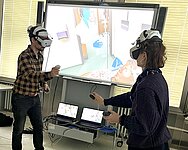Research Group "Virtual Reality Simulation in Medical Education"
Young physicians often lack readily available practical knowledge, as well as the ability to prioritize tasks and make quick clinical decisions during their first years of professional practice. However, these competencies are particularly crucial in emergency situations. Virtual Reality (VR) technology enables the creation of realistic learning environments, allowing students to train in a safe setting with standardized cases. At Universitätsklinikum Würzburg, the VR-based emergency simulation STEP-VR (Simulation-based Training of Emergencies for Physicians using Virtual Reality) was developed in collaboration with the 3D visualization company ThreeDee (Munich). Currently, we are investigating the conditions for the successful implementation of the VR training program in medical education. |
Ongoing and completed projects
Didactic evaluation of a VR-based seminarMedical students in their 5th academic year use the VR training program since October 2020 as part of an emergency medicine seminar within their clinical rotation at our Skills Lab. After simulating 3 to 4 virtual scenarios, students engage in a detailed case discussion with instructors. As part of an evaluation study, key factors such as immersion (realism), potential side effects (simulation sickness and stress), and subjective learning success were assessed. The results (published here) showed high acceptance of VR-based simulation in the chosen seminar format, a high subjective learning success, and manageable stress levels with negligible simulation sickness. - Project completed - |
RCT on learning effects using automated feedback in VR-based simulations:VR-based teaching programs generally receive high acceptance among students, but it remains unclear whether using VR provides actual learning advantages. A randomized controlled trial (preprint available here) examined learning outcomes and long-term knowledge retention, as well as influencing factors such as perceived stress and physiological stress measures during the simulation. Findings indicate that VR learning environments can lead to more sustainable knowledge acquisition compared to traditional teaching methods. This study was supported by a Research Award (Forschungsförderpreis) from the Vogel Foundation. - Project completed - |
Development of a VR-based practical examination (VR-OSCE):The use of VR in standardized, practical exams within the OSCE (Objective Structured Clinical Examination) format aims to overcome limitations of traditional exam scenarios (e.g., high personnel/material costs, organizational effort, and limited complexity). With funding from the Foundation for Innovation in Higher Education (Stiftung Innovation in der Hochschullehre), the existing VR training program was expanded to include an examination interface. Results (published here) show that VR-based exams are technically feasible and can achieve at least equivalent item characteristics (e.g. difficulty, item discrimination) compared to traditional methods. - Project completed - In a follow-up study, in cooperation with the Chair of Human-Computer Interaction at the University of Würzburg, we are investigating how prior experience with VR environments and proficiency in using VR hardware/software may impact VR-based exam results. The goal is to ensure that no students are disadvantaged in future VR-based examinations. - Ongoing project - |
|
Assessing emergency medical competencies in junior doctors via VR:Another study aimed to assess the practical emergency management skills of early-career physicians through VR simulation. Their actual performance was then compared with their self-assessment. This approach provided a detailed picture of emergency medicine competencies in junior doctors: while basic stabilizing emergency measures were well mastered, deficiencies were identified in specialized diagnostics and treatment. The full study results are available here. - Project completed - |
Development and evaluation of an interprofessional multiuser function:In emergency medicine, successful treatment often depends on teamwork between different professional groups. This subproject aimed to expand the VR program with a multiplayer function, enabling medical students and nursing trainees to train together in VR emergency scenarios. The project was funded and supported by WueDive. - Project completed - Since the multiplayer function has been available since summer 2024, we are currently researching whether VR environments can effectively train interprofessional teamwork. In our approach, the TeamSTEPPS framework serves as the basis for training and assessment, with guidance from the DACH region steering committee. Following a pilot phase, the study will be expanded to five additional German sites in early 2025. - Ongoing project - |
|
Expansion with AI-based virtual tutor using an open-source large language model (LLM):Our Speaking VirtuAI project, funded by the Foundation for Innovation in Higher Education (Stiftung Innovation in der Hochschullehre), aims to enhance the existing VR learning environment with an AI-powered virtual tutor capable of natural language processing. The Chair for Natural Language Processing (Prof. Goran Glavaš) at the University of Würzburg is a key project partner. This innovation will enable a highly immersive learning experience, allowing learners to progress at their own pace. Additionally, the AI-supported emergency training could operate independently of teaching staff, making it more frequent and cost-effective. Accompanying research will investigate whether learning success through AI-driven dialog feedback differs from static feedback methods or feedback by human instructors. - Ongoing project - |
Example images of the appearance and use of the VR environment
Team
- Dr. med. Tobias Mühling (Head of research group)
- Prof. Dr. Sarah König (Head of department)
- Franca Keicher (MD)
- Marco Lindner (MD student)
- Isabelle Späth (MD student)
- Verena Schreiner (MD student)
- Marie Lehmann (MD student)
- Jan Schaal (MD student)
- Alexander Zamzow (MD)
Cooperation partners
- ThreeDee, Agency for interactive 3D-visualization (www.threedee.de)
- Chair for Human-Computer Interaction of Wuerzburg University (News | Human-Computer Interaction (uni-wuerzburg.de))
- Chair for Natural Language Processing of Wuerzburg University (Natural Language Processing)
- Institute of Education and Student Afairs, University of Münster (IfAS)
Awards and press coverage (German)
- "Virtual Reality im Medizinstudium" in der Wissenslandkarte des bayerischen Instituts für digitale Transformation.
- DGVS Innovationspreis „Digitale Gastroenterologie“ 2019
- Hans-Werner-Feder-Preis der DGINA 2021
- Demonstration beim Besuch des bayerischen Ministerpräsidenten Markus Söder (Artikel in der Main-Post)
- Forschungsförderpreis der Vogel Stiftung Dr. Eckernkamp 2022 (Artikel in der Main-Post)
- eHealth-Podcast Folge #156 – Virtuelle Realität in medizinischer Lehre (Folge #156 - Virtuelle Realität in medizinischer Lehre - eHealth-Podcast)
- Artikel im "Tagesspiegel Background" zum Einsatz von VR in der medizinischen Ausbildung (Notwendigkeit oder spielerischer Gimmick - Tagesspiegel Background)
- Bericht über die erstmalige Durchführung einer VR-basierten OSCE-Station im Medizinstudium (https://www.uni-wuerzburg.de/aktuelles/einblick/single/news/eine-virtuelle-patientin/)
- Podcast „Arbeit Bildung Zukunft“ – Folge #10 „Virtuelle Realität in der Medizinlehre (https://www.wueconomics.de/episodes/abz-02-10-vr-in-der-medizin-lehre)
Publications
- M. Lehmann, J. Mikulasch, H. Poimann, J. Backhaus, S. König, T. Mühling (2025). Training and Assessing Teamwork in Interprofessional Virtual Reality-based Simulation using the TeamSTEPPS framework – Protocol for a Randomized Pre-post Intervention Study. (Preprint) https://preprints.jmir.org/preprint/68705
- M. Lindner, T. Leutritz, J. Backhaus, S. König, T. Mühling (2025). Knowledge Gain and the Impact of Stress in a Virtual Reality-based Medical Emergencies Training with Automated Feedback – A Randomized Controlled Trial. (Preprint). https://preprints.jmir.org/preprint/67412
- T. Mühling, V. Schreiner, M. Appel, T. Leutritz, S. König (2025). Clinical Competency Assessments: A Comparative Study of Virtual-Reality-Based and Traditional Physical OSCE Stations. Journal of Medical Internet Research https://www.jmir.org/2025/1/e55066
- F. Keicher, J. Backhaus, S. König, T. Mühling (2024). Virtual reality for assessing emergency medical competencies in junior doctors – a pilot study. International Journal of Emergency Medicine. https://doi.org/10.1186/s12245-024-00721-2
- M. Lindner, T. Leutritz, J. Backhaus, S. König, T. Mühling (2023). Kompetenzgewinn und der Einfluss von Stress in einer Virtual Reality-basierten Notaufnahme. Jahrestagung der Gesellschaft für Medizinische Ausbildung 2023. doi: 10.3205/23gma151
- F. Keicher, T. Mühling, M. Müller, K. Ruf, S. König (2023). Von der Theorie in die (simulierte) Praxis – pädiatrische Notfälle in Virtual Reality für PJ-Studierende und BlockpraktikantInnen. Jahrestagung der Gesellschaft für Medizinische Ausbildung 2023. doi: 10.3205/23gma177
- T. Mühling, I. Späth, J. Backhaus, N. Milke, S. Oberdörfer, A. Meining, M. Latoschik, S. König (2023). Virtual reality in medical emergencies training: benefits, perceived stress, and learning success. Multimedia Systems. DOI: https://doi.org/10.1007/s00530-023-01102-0
Contact us
For inquiries, please contact: Tobias Mühling , MD (muehling_t(at)ukw.de)


